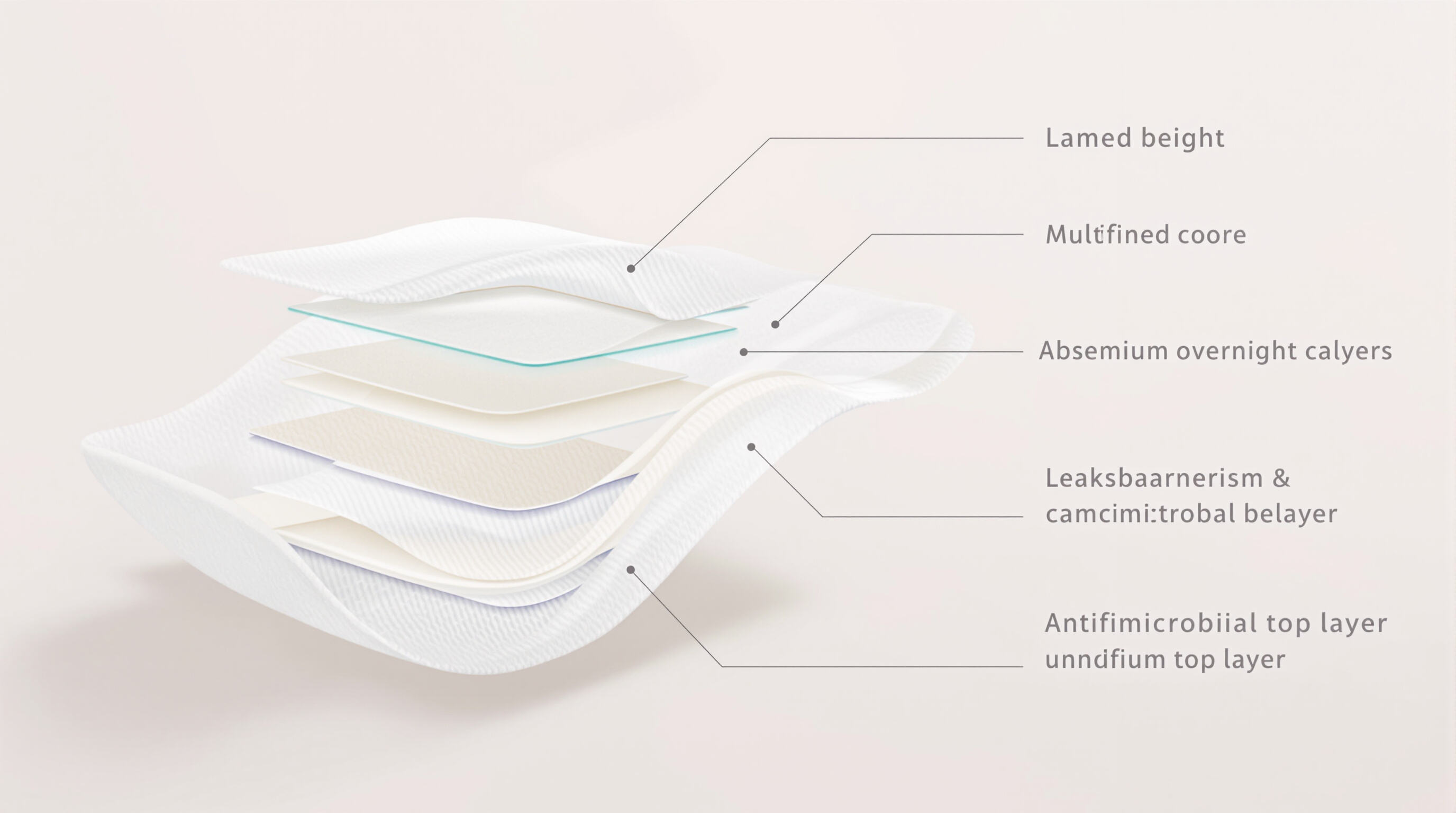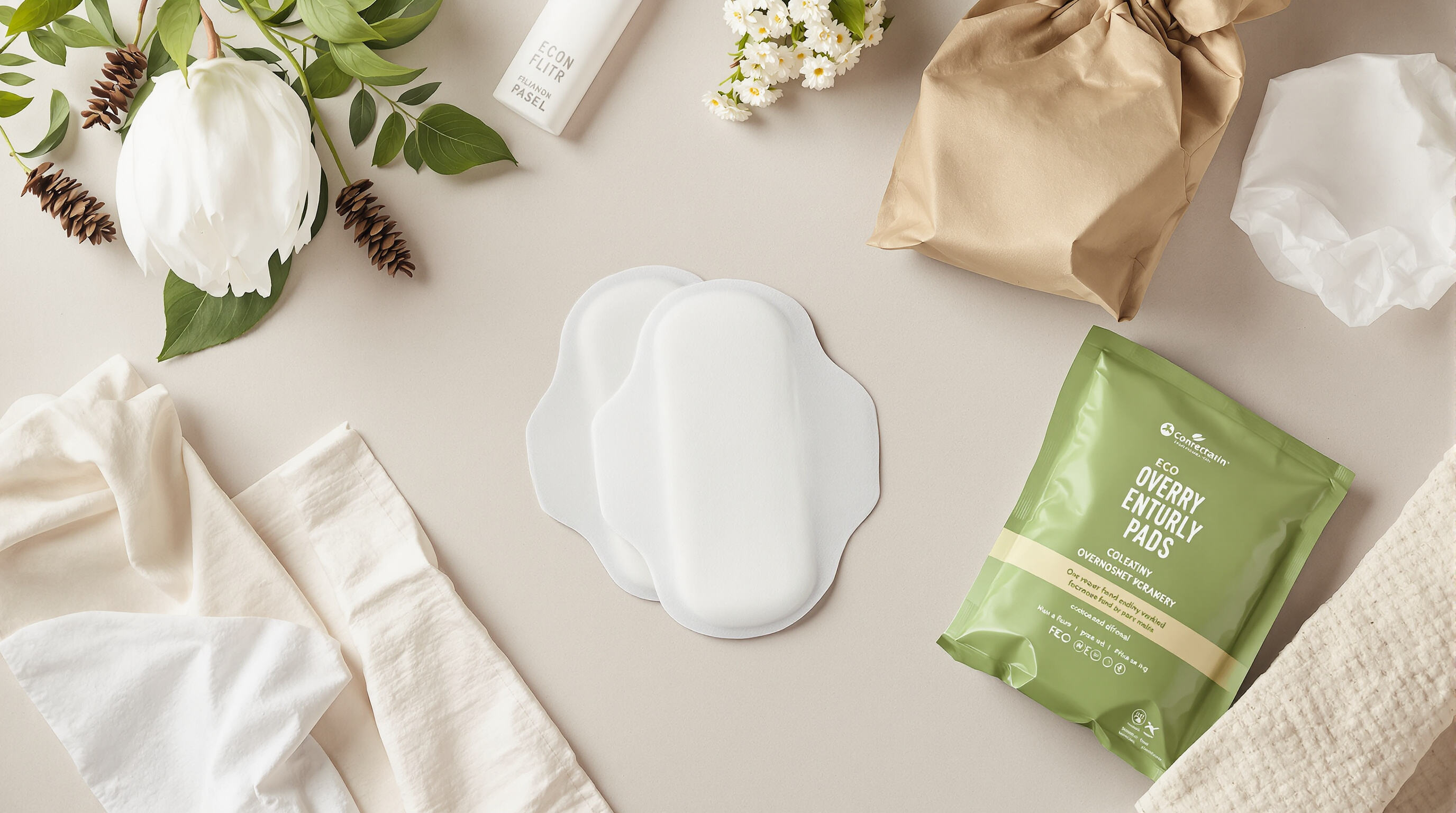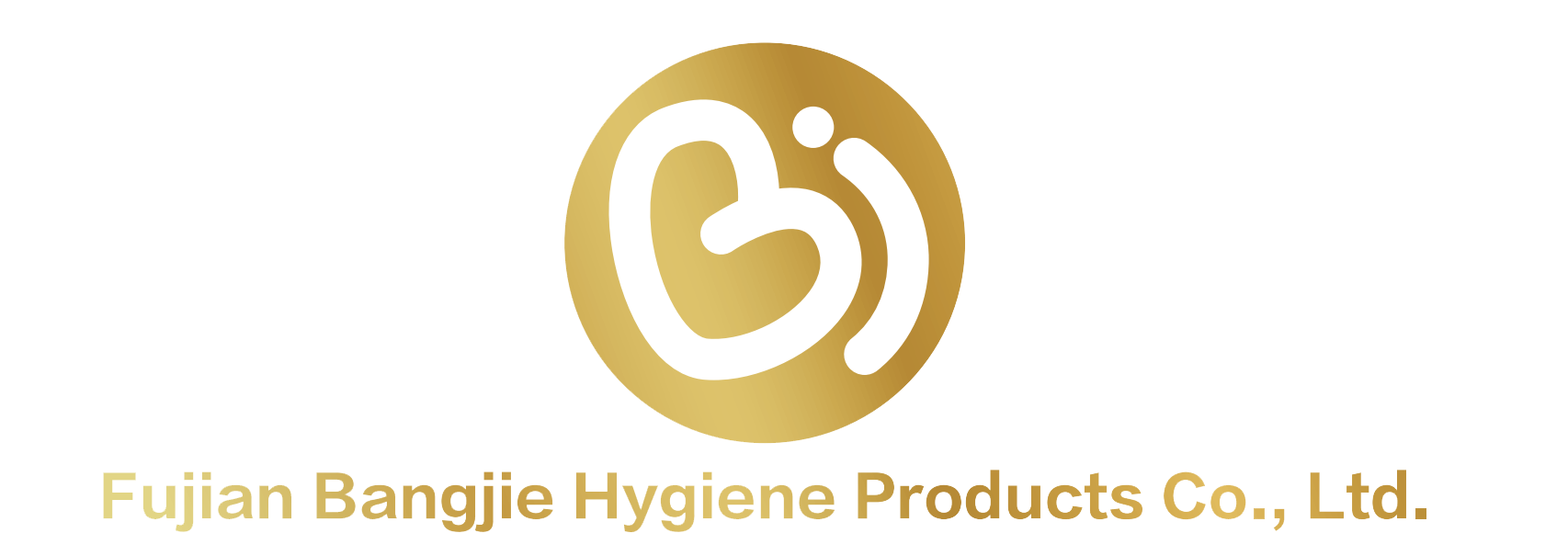ຜ້າອ້ອມຄືນໜຶ່ງ ທີ່ມີຊັ້ນຄວບຄຸມກິ່ນ ສຳລັບສັ່ງຊື້ເປັນລໍາຈຳນວນຫຼາຍໃນອຸດສະຫະກຳໂຮງແຮມ
ການປັບປຸງປະສົບການຂອງແຂກດ້ວຍຜ້າອ້ອນທີ່ມີຄຸນນະພາບສໍາລັບການນອນຄ້າງຄືນ
ເທກໂນໂລຊີຄວບຄຸມກິ່ນໃນຜ້າອ້ອນທີ່ໃຊ້ໃນການນອນຄ້າງຄືນສົ່ງຜົນໃຫ້ແຂກຮູ້ສຶກສະດວກສະບາຍຂຶ້ນແນວໃດ
ຊັ້ນກິ່ນທີ່ເປັນປະຈຸບັນທີ່ສຸດໃນຜະລິດຕະພັນລະດັບສູງ ຜ້າອະນາໄມຄ້າງຄືນ ສຳລັບໂຮງແຮມແລ້ວມັນເຮັດວຽກຕ່າງກັນຈາກຜະລິດຕະພັນປົກກະຕິ. ແທນທີ່ຈະຄຸມກິ່ນເທົ່ານັ້ນ, ມັນມີສ່ວນປະສົມຕ້ານເຊື້ອແບັກທີເຣັຍພ້ອມທັງແຜ່ນອານິອນນ້ອຍໆທີ່ແທ້ຈິງແລ້ວແຍກໂມເລກຸນກິ່ນອອກໃນລະດັບເຄມີ. ຕາມລາຍງານຂອງອຸດສະຫະກຳປີກາຍ, ໂຮງແຮມທີ່ປ່ຽນມາໃຊ້ແຜ່ນພິເສດເຫຼົ່ານີ້ມີການຫຼຸດລົງຢ່າງຫຼວງຫຼາຍຂອງຄຳຮ້ອງເຣື່ອງການຖິ້ມຜະລິດຕະພັນຖືພາ. ຕົວເລກກໍ່ດີຫຼາຍເຊັ່ນກັນ - ຄຳຮ້ອງທີ່ຫຼຸດລົງປະມານ 62%. ນອກຈາກນັ້ນ, ຜູ້ເຂົ້າພັກບໍ່ສັງເກດເຫັນກິ່ນຄ້າງຢູ່ໃນພື້ນທີ່ຫ້ອງນ້ຳສາທາລະນະອີກຕໍ່ໄປ. ສຳລັບສະຖານທີ່ພັກອາໄສທີ່ດີ, ເທກໂນໂລຊີນີ້ກຳລັງກາຍເປັນສິ່ງຈຳເປັນຍ້ອນຜູ້ເດີນທາງມັກຄາດຫວັງໃຫ້ຄວາມຕ້ອງການສ່ວນຕົວຂອງເຂົາເຈົ້າເປັນຄວາມລັບ. ປັດຈຸບັນຜູ້ເຂົ້າພັກສ່ວນຫຼາຍພິຈາລະນາວ່າ "ການດູແລທີ່ບໍ່ເຫັນ" ແມ່ນສິ່ງສຳຄັນຫຼາຍຕໍ່ປະສົບການໂດຍລວມຂອງເຂົາເຈົ້າເວລາພັກຢູ່ສະຖານທີ່ຫຼູຫຼາ.
ປະສິດທິພາບການດູດຊັບສູງເປັນລັກສະນະຂອງການດູແລໂຮງແຮມຊັ້ນສູງ
ຜ້າອ້ອມທີ່ໃຊ້ໃນການສະອາດສ່ວນຕົວໃນຂ້າມຄືນ ທີ່ສາມາດໃຊ້ໄດ້ 8 ຫາ 12 ຊົ່ວໂມງ ມັກປະກອບມີວັດຖຸດິບເຊັ່ນ: ເຊລລູໂລສ (cellulose) ພ້ອມດ້ວຍໂພລີເມີ (Super Absorbent Polymers) ທີ່ເອີ້ນວ່າ SAP, ຊຶ່ງຊ່ວຍໃຫ້ຜ້າອ້ອມສາມາດເກັບໄດ້ປະມານ 350 ມິນລີລິດ. ສິ່ງນີ້ມີຄວາມສຳຄັນຫຼາຍຍ້ອນຊ່ວຍໃຫ້ແມ່ຍິງສາມາດນອນຫຼັບໄດ້ຕະຫຼອດຄືນໂດຍບໍ່ມີການລົ້ນອອກມາ. ການທົດສອບໃໝ່ໆໃນໂຮງແຮມພົບວ່າ ເມື່ອແມ່ຍິງທີ່ມີປະຈຳເດືອນຫຼາຍໄດ້ໃຊ້ຜ້າອ້ອມຄວາມອາດສາມາດສູງ ພວກເຂົາໃຫ້ຄະແນນຄວາມສະດວກສະບາຍດີຂຶ້ນ 40% ເມື່ອທຽບກັບຜະລິດຕະພັນປົກກະຕິ. ຜູ້ຈັດການໂຮງແຮມກໍ່ເຊັ່ນກັນ. ປະມານສາມໃນສີ່ຂອງກຸ່ມໂຮງແຮມລະດັບສູງໄດ້ເລີ່ມໃຫ້ຄວາມສຳຄັນຕໍ່ຄວາມອາດສາມາດໃນການຊຶມຊັບເປັນອັນດັບທຳອິດເມື່ອຊື້ຜະລິດຕະພັນດ້ານສຸຂາພິບານສຳລັບແຂກໃນປັດຈຸບັນ.
ການເຊື່ອມໂຍງຜະລິດຕະພັນດູແລສຸຂາພິບານແມ່ຍິງເຂົ້າໃນມາດຕະຖານການບໍລິການແຂກ
ຍີ່ຫໍ້ດ້ານການບໍລິການທີ່ມີມຸມມອງໄກເດີນ ປັດຈຸບັນໄດ້ຖືຜ້າອ້ອມໃນຂ້າມຄືນເປັນອຸປະກອນຈຳເປັນພື້ນຖານ ແລະ ສະສົມໄວ້ພ້ອມກັບເຄື່ອງອຸປະໂພກບໍລິໂພກ ແລະ ຜ້າປູທີ່ນອນ. ວິທີປະຕິບັດທີ່ດີທີ່ສຸດລວມມີ:
- ວາງຜ້າອ້ອມທີ່ຫຸ້ມຫໍ່ແຕ່ລະຊິ້ນໄວ້ໃນຫ້ອງນ້ຳຂອງແຂກທຸກຫ້ອງ 100%
- ການຝຶກອົບຮົມພະນັກງານໃຫ້ເຕີມອຸປະກອນໃໝ່ໃນຂະນະໃຫ້ບໍລິການຈັດຫ້ອງໃນຕອນກາງຄືນ
- ສະເໜີການຈັດສົ່ງຢ່າງລະອຽດຜ່ານການສະກັນ QR-code ໃນບັນດາບ້ານພັກທີ່ມີລະດັບຄຸນນະພາບສູງ
ການປ່ຽນແປງນີ້ສະທ້ອນໃຫ້ເຫັນເຖິງຂໍ້ມູນອຸດສາຫະກໍາໃນວົງກ້ວາງ ສະແດງໃຫ້ເຫັນວ່າບັນດາທີ່ພັກທີ່ມີນະໂຍບາຍດ້ານສຸຂາພິບານແບບຄົບຖ້ວນສົມບູນສາມາດບັນລຸຄະແນນຄວາມຊື່ສັດຈາກນັກເດີນທາງແມ່ຍິງສູງຂຶ້ນ 28% ເມື່ອທຽບກັບຄູ່ແຂ່ງຂັນ.
ເທກໂນໂລຊີຄວບຄຸມກິ່ນເຮັດວຽກແນວໃດໃນຜ້າອ້ອນທີ່ໃຊ້ໃນຕອນກາງຄືນ
ຜູ້ໃຫ້ບໍລິການດ້ານໂຮງແຮມໃຫ້ຄວາມສະດວກສະບາຍແກ່ຜູ້ເຂົ້າພັກດ້ວຍເທກໂນໂລຊີຄວບຄຸມກິ່ນຂັ້ນສູງໃນຜ້າອ້ອນໃຊ້ໃນຕອນກາງຄືນ. ນະວັດຕະກໍານີ້ເຊື່ອມໂຍງລະຫວ່າງວິທະຍາສາດ ແລະ ວິສະວະກໍາວັດສະດຸເພື່ອແກ້ໄຂບັນຫາທີ່ພົບເລື້ອຍ: 83% ຂອງນັກເດີນທາງໃຫ້ຄະແນນຜະລິດຕະພັນດ້ານສຸຂາພິບານທີ່ບໍ່ມີກິ່ນເປັນສິ່ງສໍາຄັນຕໍ່ປະສົບການທີ່ດີໃນຂະນະເຂົ້າພັກ (ລາຍງານດ້ານສຸຂະພາບໃນໂຮງແຮມ 2023).
ພື້ນຖານທາງດ້ານວິທະຍາສາດຂອງຊັ້ນວັດສະດຸທີ່ຊ່ວຍກໍາຈັດກິ່ນບໍ່ດີໃນຜ້າອ້ອນ
ຊັ້ນກຳຈັດກິ່ນໃຊ້ຖ່ານກັ້ນທີ່ເຄື່ອນໄຫວ ຫຼື ໄຍສາຍທີ່ປ່ຽນແປງໄອໂອນ ເພື່ອຈັບໂມເລກຸນກິ່ນໃນລະດັບໂມເລກຸນ. ວັດສະດຸເຫຼົ່ານີ້ສ້າງສິ່ງກີດຂວາດທາງດ້ານຮ່າງກາຍທີ່ປ້ອງກັນການເຕີບໂຕຂອງແບັກທີເຣັຍ - ສາເຫດຫຼັກຂອງກິ່ນທາງເພດ. ການທົດສອບທາງດ້ານການແພດສະແດງໃຫ້ເຫັນວ່າຊັ້ນເຫຼົ່ານີ້ຫຼຸດການຮັບຮູ້ກິ່ນລົງ 78% ໃນໄລຍະ 12 ຊົ່ວໂມງເມື່ອທຽບກັບຜ້າອ້ອມທົ່ວໄປ (ວາລະສານວິທະຍາສາດເສັ້ນໄຍ 2024).
ເຕັກໂນໂລຊີຕ້ານເຊື້ອແບັກທີເຣັຍ ແລະ ໂອນລົບທີ່ປະສົມຢູ່ໃນເພື່ອຄວາມສະອາດ ແລະ ຄວາມສດໃສ
ຜູ້ຜະລິດຊັ້ນນຳປະສົມສອງວິທີການດັ້ງເດີມ:
- **ຕົວຢາຕ້ານເຊື້ອແບັກທີເຣັຍ** ເຊັ່ນ: ໄອໂອນເງິນທີ່ລົບກວນເຍື່ອຫຸ້ມເຊື້ອແບັກທີເຣັຍ
- **ແຜ່ນໂອນລົບ** ທີ່ຜະລິດໄອໂອນລົບທີ່ກຳຈັດສານເຄມີທີ່ເຮັດໃຫ້ເກີດກິ່ນ
ລະບົບການກຳຈັດສອງຊັ້ນນີ້ຊ່ວຍຮັກສາຄວາມສົມດຸນຂອງ pH ໃນຂະນະທີ່ໃຫ້ຄວາມສດໃສຢ່າງຕໍ່ເນື່ອງ, ຕາມການທົດສອບໃນປີ 2023 ທີ່ສະແດງໃຫ້ເຫັນວ່າ 92% ຂອງຜູ້ໃຊ້ງານລາຍງານວ່າຄວາມໝັ້ນໃຈດີຂຶ້ນໃນການໃຊ້ຕອນກາງຄືນ.
| ເຕັກໂນໂລຊີ | ວິທີການເຮັດໃຫ້ເຄື່ອນໄຫວ | ຊ່ວງເວລາການກຳຈັດກິ່ນ | ຜົນປະໂຫຍດຫຼັກ |
|---|---|---|---|
| ບັນທຶກຊາດທີ່ແອກທິດ | ການດູດຊັບທາງດ້ານຮ່າງກາຍ | 8-10 ຊົ່ວໂມງ | ການຈັບກິ່ນຢ່າງທັນທີ |
| ອິໂອນເງິນ | ການປະຕິກິລິຍາເຄມີ | 10-12 ຊົ່ວໂມງ | ການປ້ອງກັນການເຕີບໂຕຂອງແບັກທີເຣັຍ |
| ການປ່ອຍອິໂອນລົບ | ການສ້າງພັນທະບັນດະນິໂລແອດ | 6-8 ຊົ່ວໂມງ | ການກຳຈັດໂມເລກຸນກິ່ນ |
ການປຽບທຽບກົນໄກກຳຈັດກິ່ນໃນຜ້າອ້ອມກາງຄືນທີ່ນຳໃຊ້ຕະຫຼາດ
ໃນຂະນະທີ່ທາງເລືອກທີ່ມີຄຸນນະພາບທັງໝົດນຳໃຊ້ຊຸດດູດຊຶມ, ຄວາມແຕກຕ່າງຈະເກີດຂື້ນໃນການຈັດການກິ່ນ:
- **ລະບົບດູດຊຶມແບ່ງທາງ** ສົ່ງຂອງແຫຼວອອກຈາກພື້ນຜິວ (ເຮັດໃຫ້ແຫ້ງໄວຂື້ນ 35% )
- **ແຜ່ນຫຼັງທີ່ລົມສາມາດຜ່ານໄດ້** ລົດການເຕີບໂຕຂອງແບັກທີເຣັຍທີ່ກ່ຽວຂ້ອງກັບຄວາມຊື້ນໄດ້ 42%
- **ແຜ່ນດ້ານເທິງທີ່ຊ່ວຍດຸໜຸນ pH** ສາມາດຮັກສາລະດັບຄວາມເປັນກົດທີ່ເໝາະສົມກັບຜິວໜັງ
ການປະດິດໃໝ່ດ້ານຜ້າໃນປັດຈຸບັນສະແດງໃຫ້ເຫັນວ່າວັດສະດຸທີ່ປ້ອນອານິອອນໃໝ່ມີອາຍຸການໃຊ້ງານຍາວນານຂຶ້ນ 30% ຕໍ່ວົງຈອນການໃຊ້ງານເມື່ອທຽບກັບມາດຕະຖານປີ 2020
ກໍລະນີສຶກສາ: ການຫຼຸດຜ່ອນການຮ້ອງເຣີຍຕິຊົມຂອງແຂກດ້ວຍຜ້າປູທີ່ຄວບຄຸມກິ່ນເສຍຍທີ່ທັນສະໄໝ
ເຄືອຂ່າຍໂຮງແຮມທີ່ມີ 250 ຫ້ອງໄດ້ຫຼຸດຜ່ອນການຮ້ອງເຣີຍຕິຊົມທີ່ກ່ຽວຂ້ອງກັບສຸຂາພິບານລົງ 45% ຫຼັງຈາກນຳໃຊ້ຜ້າປູທີ່ເສີມອານິອອນໃນຫ້ອງນ້ຳຂອງແຂກ. ທີມງານເບິກຮັກສາລາຍງານວ່າມີຄຳຂໍສຳລັບການທຳຄວາມສະອາດຫ້ອງພັກໃນໄລຍະກາງລົງ 62%, ໃນຂະນະທີ່ການສຳຫຼວດຫຼັງຈາກການພັກອາໄສສະແດງໃຫ້ເຫັນການປັບປຸງຂຶ້ນ 31% ໃນການຈັດອັນດັບຄວາມສະອາດຂອງຫ້ອງນ້ຳ (Hospitality Management Quarterly 2023).
ການອອກແບບ ແລະ ຄວາມປະຕິບັດງານຂອງຜ້າອ້ອມທີ່ຊຶມຊັບສູງສຳລັບໃຊ້ໃນຕອນກາງຄືນ

ການອອກແບບເພື່ອປ້ອງກັນການຮົ່ວໄຫຼໃນຜ້າອ້ອມທີ່ໃຊ້ໃນຕອນກາງຄືນສຳລັບການໃຊ້ງານຕໍ່ເນື່ອງ 8-12 ຊົ່ວໂມງ
ຜ້າອ້ອມແກ້ໄຂ້ສຳລັບຄືນນີ້ໃຊ້ການກັ້ນຮົ່ວໄປຫຼາຍທິດທາງ ແລະ ຮູບຮ່າງທີ່ປັບຕາມສະພາບຮ່າງກາຍເພື່ອປ້ອງກັນການໄຫຼຂ້າງເວລານອນ. ໂຄງສ້າງຊຶມຊັບແບບແຈກຈ່າຍ ຈະແຈກຈ່າຍຂອງແຫຼວຢ່າງສະເໝີພາບໃນແຜ່ນຫຼັງທີ່ກ້ວາງຂຶ້ນ 30%, ໃນຂະນະທີ່ຜະ້າກັ້ນນ້ຳສ້າງເຂດກັ້ນໄວ້ສອງຊັ້ນ. ລັກສະນະເຫຼົ່ານີ້ເຮັດໃຫ້ສາມາດປ້ອງກັນໄດ້ 8-12 ຊົ່ວໂມງ, ສຳຄັນຫຼາຍສຳລັບລູກຄ້າໂຮງແຮມທີ່ຕ້ອງການການປ້ອງກັນຕະຫຼອດຄືນ.
ວັດຖຸດິບຂອງໂຄງສ້າງ ແລະ ອັດຕາການຊຶມຊັບໃນຜ້າອ້ອມແກ້ໄຂ້ທີ່ມີປະສິດທິພາບສູງ
ແບບທີ່ທັນສະໄໝລ້າສຸດປະສົມເອົາເສັ້ນໃຍຈາກພືດເຂົ້າກັບໂພລີເມີທີ່ຊື່ມຊັບສູງທີ່ເຂົາເຈົ້າເອີ້ນວ່າ SAP, ສະນັ້ນມັນສາມາດຊື່ມຊັບໄດ້ຫຼາຍປະມານ 900 ຫາ 1200 ກຼາມຕໍ່ຕາແມັດ. ການຄົ້ນຄວ້າບາງຢ່າງໃນປີ 2021 ໄດ້ເບິ່ງເນື້ອໃນຊີວະພາຍແລະພົບວ່າເມື່ອປະສົມ sodium alginate ກັບ carboxymethyl cellulose ຫຼື CMC, ຕົວເລືອກເຫຼົ່ານີ້ມີປະສິດທິພາບດີເທົ່າກັບຜະລິດຕະພັນ SAP ທຳມະດາແຕ່ໃຊ້ວັດຖຸສັງເຄາະນ້ອຍລົງປະມານ 18 ເປີເຊັນ. ພ້ອມກັນນັ້ນຍັງມີຊັ້ນຜ້າບໍ່ຖັກທີ່ຕ້ານເຊື້ອແບັກທີເຣັຍທີ່ຖືກປິ່ນປົວດ້ວຍສານສະກັດຈາກພືດຫຼາກຫຼາຍ. ການທົດສອບສະແດງໃຫ້ເຫັນວ່າມັນສາມາດຫຼຸດການເຕີບໂຕຂອງແບັກທີເຣັຍໄດ້ຫຼາຍໃນໄລຍະໃຊ້ເວລາຍາວ, ປະມານ 91 ເປີເຊັນຕາມທີ່ຂ້ອຍໄດ້ອ່ານ. ສິ່ງເຫຼົ່ານີ້ເປັນສິ່ງທີ່ຍອດເຢີ່ຍິ່ງເມື່ອພິຈາລະນາເຖິງຄວາມສຳຄັນຂອງເຕັກໂນໂລຊີນີ້ໃນການນຳໃຊ້ປະຈຳວັນ.
ການທົດລອງໃຊ້ໂດຍຜູ້ໃຊ້: ການປະເມີນຄວາມສະດວກສະບາຍ ແລະ ຄວາມແຫ້ງໃນໄລຍະໃຊ້ເວລາຍາວ
ການທົດລອງຈາກພາກສ່ວນທີສາມ ກັບຜູ້ເຂົ້າຮ່ວມ 450 ຄົນ ແລະ 89% ລາຍງານວ່າບໍ່ຮູ້ສຶກເຖິງຄວາມຊຸ່ມຊື່ນຫຼັງຈາກໃຊ້ຜ້າອ້ອມແຂວນຂະໜາດໃຫຍ່ໃນຕອນກາງຄືນເປັນເວລາ 10 ຊົ່ວໂມງ. ຜ້າບຸ້ງທີ່ລົມລະອອງສາມາດຫຼຸດຜ່ອນການກະຕຸ້ນຜິວໜັງລົງ 73% ເມື່ອທຽບກັບຕົວຢ່າງທົ່ວໄປ, ແລະ 94% ລາຍງານວ່າຜ້າຊັ້ນເທິງເກືອບບໍ່ຮູ້ສຶກເຖິງໃນຂະນະທີ່ເຄື່ອນໄຫວ ເຊິ່ງເປັນການທົດລອງທີ່ລຽນແບບການນອນປ່ຽນທ່າທາງ.
ວິທີແກ້ໄຂການສະໜອງສິນຄ້າເປັນລໍາຈຳນວນຫຼວງໃຫຍ່ ສຳລັບໂຮງແຮມ ແລະ ສາຍສາຂອງໂຮງແຮມ
ການຈັດສົ່ງຜ້າອ້ອມແຂວນຂະໜາດໃຫຍ່ ໄປຍັງເຄືອຂ່າຍສະຖານທີ່ຕ່າງໆ ໄດ້ຢ່າງມີປະສິດທິພາບ
ກຸ່ມໂຮງແຮມໃຫຍ່ໆ ຈຳເປັນຕ້ອງມີການຈັດສົ່ງທີ່ດີຖ້າພວກເຂົາຕ້ອງການສົ່ງຜ້າອ້ອນສຳລັບຄືນດຽວນັ້ນໄປໃຫ້ແກ່ລູກຄ້າຢ່າງສະໝຳເສີມໃນທຸກສະຖານທີ່. ເມື່ອໂຮງແຮມໃຊ້ລະບົບຄັງສິນຄ້າສູນກາງ, ພວກເຂົາສາມາດຕິດຕາມສິນຄ້າທີ່ມີຢູ່ໃນແຕ່ລະສະຖານທີ່ໄດ້ດີຂຶ້ນ. ສິ່ງນີ້ຊ່ວຍປ້ອງກັນບໍ່ໃຫ້ເກີດການສັ່ງຊື້ສິນຄ້າຫຼາຍເກີນໄປ ຫຼື ບໍ່ພຽງພໍໃນເວລາທີ່ຕ້ອງການ. ບໍລິສັດຈຳນວນຫຼາຍໄດ້ຕັ້ງສາງຂັ້ນພາກພື້ນເຊິ່ງຊ່ວຍໃຫ້ການສົ່ງສິນຄ້າໄປຍັງແຕ່ລະສະຖານທີ່ໄດ້ໄວຂຶ້ນ ກ່ວາການສັ່ງຊື້ໂດຍກົງຈາກຜູ້ຜະລິດ. ບາງຍີ່ຫໍ້ໂຮງແຮມໃຫຍ່ເວົ້າວ່າ ພະນັກງານຂອງພວກເຂົາຕ້ອງຈັດການກັບຄຳຂໍສຳລັບຜ້າອ້ອນເພີ່ມເຕີມໃນເວລາດຽວກັນຫຼຸດລົງປະມານ 30 ເປີເຊັນ ໂດຍນັບຕັ້ງແຕ່ພວກເຂົາເລີ່ມໃຊ້ລະບົບຄອມພິວເຕີ້ເພື່ອຕິດຕາມລະດັບສິນຄ້າອັດຕະໂນມັດ. ຄວາມແຕກຕ່າງສາມາດເຫັນໄດ້ຈາກການດຳເນີນງານທີ່ສະດວກສະບາຍຂຶ້ນໃນໄລຍະທີ່ມີການເຄື່ອນໄຫວຫຼາຍ.
ການປະຢັດຄ່າໃຊ້ຈ່າຍ ແລະ ໂອກາດໃນການສ້າງຍີ່ຫໍ້ຜ່ານການສັ່ງຊື້ຜ້າອ້ອນເປັນລໍາຈຳນວນຫຼາຍ
ການຊື້ຜ້າອ້ອມໃນເວລາຂ້າມຄືນໃນປະລິມານຫຼວງຫຼາຍສາມາດຫຼຸດຕົ້ນທຶນຕໍ່ຫົວໄດ້ປະມານ 18 ຫາ 25 ເປີເຊັນເມື່ອປຽບທຽບກັບການຊື້ໃນປະລິມານນ້ອຍໆຢູ່ບ່ອນນີ້ບ່ອນນັ້ນ, ຕາມຂໍ້ມູນທີ່ພວກເຮົາເຫັນໃນຫ່ວງສາຍການສະໜອງຂອງໂຮງແຮມ. ໂຮງແຮມຍັງມັກທີ່ສາມາດປັບແຕ່ງການຫຸ້ມຫໍ່ຕາມແບບຂອງຕົນເອງເພື່ອສາມາດສື່ສານຂໍ້ຄວາມຍີ່ຫໍ້ຂອງເຂົາເຈົ້າກ່ຽວກັບສຸຂະພາບ ຫຼື ສະແດງເຄື່ອງໝາຍຢັ້ງຢືນສິ່ງແວດລ້ອມ. ປະຈຸບັນນີ້ແຂກສ່ວນຫຼາຍມັກເຫັນສິ່ງທີ່ເປັນມິດກັບສິ່ງແວດລ້ອມ, ສິ່ງທີ່ແຂກເດີນທາງປະມານສີ່ໃນຫ້າຄົນມັກຊອກຫາເວລາເລືອກທີ່ພັກ. ການເຊັນສັນຍາໃນໄລຍະຍາວກັບຜູ້ສະໜອງທີ່ໄວ້ໃຈໄດ້ຊ່ວຍຮັກສາລາຄາໃຫ້ຄົງທີ່ໄປຕະຫຼອດເວລາ, ສິ່ງທີ່ສຳຄັນຍ້ອນແຂກມັກປ່ຽນໃຈເລື້ອຍໆກ່ຽວກັບສິ່ງທີ່ຖືວ່າເປັນຜະລິດຕະພັນດ້ານສຸຂະອະນາໄມທີ່ມີຄຸນນະພາບໃນປັດຈຸບັນ.
ຄວາມຍືນຍົງ ແລະ ມາດຕະຖານດ້ານສຸຂະອະນາໄມໃນຜະລິດຕະພັນດູແລສ່ວນບຸກຄົນຂອງອຸດສະຫະກຳໂຮງແຮມ

ວັດຖຸດິບເປັນມິດກັບສິ່ງແວດລ້ອມໃນຜ້າອ້ອມໃນເວລາຂ້າມຄືນໂດຍບໍ່ຕ້ອງແລກເອົາປະສິດທິພາບ
ໃນມື້ນີ້ຜ້າອ້ອມສໍາລັບຄືນນີ້ກໍາລັງປ່ຽນແປງມາດຕະຖານດ້ານສິ່ງແວດລ້ອມແລະປະສິດທິພາບ. ຍີ່ຫໍ້ຕ່າງໆໄດ້ເລີ່ມນໍາໃຊ້ຊັ້ນວັດຖຸທີ່ເຮັດຈາກພືດພັນພ້ອມທັງຊັ້ນດ້ານຫຼັງທີ່ສາມາດແຍກຕົວອອກໄດ້ຕາມການຜ່ານໄປຂອງເວລາ. ບາງຍີ່ຫໍ້ໃຫຍ່ໄດ້ປ່ຽນມາໃຊ້ໃຈກາງເສັ້ນໃຍຈາກເຊືອກໃນເວລາກ່ອນໜ້ານີ້, ເຊິ່ງດູດຊຶມໄດ້ຫຼາຍຂຶ້ນປະມານ 35 ເປີເຊັນເມື່ອທຽບກັບວັດຖຸທີ່ໃຊ້ກ່ອນໜ້ານີ້ຕາມລາຍງານສຸຂາພິບານຂອງອຸດສະຫະກໍາໂຮງແຮມຈາກປີກ່ອນ. ແລະນີ້ເຊີນ: ການຫຸ້ມຫໍ່ກໍ່ກໍາລັງກາຍເປັນມິດຕໍ່ສິ່ງແວດລ້ອມຫຼາຍຂຶ້ນດ້ວຍ! ການຫຸ້ມຫໍ່ທີ່ເຮັດຈາກໂພລີເມີຂ້າວໂດຍອຸດສາຫະກໍາການປຸງແຕ່ງຂີ້ເຫຍື້ອໃນສະຖານທີ່ອຸດສາຫະກໍາແມ່ນໃຊ້ເວລາປະມານສິບສອງອາທິດເທົ່ານັ້ນກ່ອນຈະແຍກໂດຍສົມບູນ. ສໍາລັບຜູ້ຈັດການໂຮງແຮມທີ່ຕ້ອງການຫຼຸດຜົນຜະລິດຂີ້ເຫຍື້ອ, ຜະລິດຕະພັນໃໝ່ເຫຼົ່ານີ້ຫມາຍຄວາມວ່າພວກເຂົາສາມາດຫຼຸດການນໍາໃຊ້ຢາງພາລາລົງໄດ້ເຖິງສອງສ່ວນສາມຂອງແຕ່ລະຫ້ອງໂດຍບໍ່ຕ້ອງເຮັດໃຫ້ແຂກກັງວົນກ່ຽວກັບການຮົ່ວໄຫຼໃນໄລຍະພັກອາໄສຂອງເຂົາເຈົ້າ.
ການບັນລຸມາດຕະຖານສຸຂາພິບານສາກົນສໍາລັບຜະລິດຕະພັນດ້ານສຸຂະອະນາໄມທີ່ໃຊ້ໃນໂຮງແຮມ
ສຳລັບຜ້າອ້ອນທີ່ໃຊ້ໃນໂຮງແຮມ ແລະ ສະຖານທີ່ໃຫ້ບໍລິການດ້ານການທ່ອງທ່ຽວ ຕ້ອງຜ່ານມາດຕະຖານທີ່ກຳນົດໄວ້ກ່ອນ. ມາດຕະຖານດັ່ງກ່າວລວມມີການຢັ້ງຢືນຕາມມາດຕະຖານ ISO 13485 ວ່າດ້ວຍການຄວບຄຸມຄຸນນະພາບອຸປະກອນການແພດ, ພ້ອມທັງຜ່ານການທົດສອບ OEKO-TEX Standard 100 ກ່ຽວກັບສານເຄມີອັນຕະລາຍ. ສະຫະภาพยີຣົບໄດ້ຜ່ານລະບຽບການໃໝ່ໃນການກຳນົດຂໍ້ມູນທີ່ຕ້ອງລະບຸໃສ່ບັນຈຸພັນຕະພັນທີ່ໃຊ້ໃນການຮຽນຮ່າງເດືອນ, ເຊິ່ງໂຮງແຮມຂັ້ນສູງສ່ວນໃຫຍ່ໄດ້ເລີ່ມປະຕິບັດຕາມແລ້ວ - ປະມານ 78 ເປີເຊັນຂອງໂຮງແຮມທັງໝົດ. ໂຮງແຮມທີ່ປະຕິບັດຕາມຄຳແນະນຳຂອງສະພາການທ່ອງທ່ຽວທີ່ຍືນຍົງສາກົນ (Global Sustainable Tourism Council) ມັກຈະໄດ້ຮັບຄຳຕອບແບບໃນທາງບວກຈາກລູກຄ້າຫຼາຍຂຶ້ນໃນເລື່ອງສະພາບຄວາມສະອາດຂອງສະຖານທີ່ໃຫ້ບໍລິການ. ການສຳຫຼວດຊີ້ໃຫ້ເຫັນວ່າ ໂຮງແຮມເຫຼົ່ານີ້ໄດ້ຮັບຄຳຄິດເຫັນໃນທາງບວກຫຼາຍຂຶ້ນປະມານ 40% ສຳລັບຄວາມສະອາດ ຖ້າທຽບກັບໂຮງແຮມທີ່ບໍ່ໄດ້ຮັບການຢັ້ງຢືນຄຸນນະພາບ.
ການຊົດເຊີຍຄວາມສະດວກຂອງຜະລິດຕະພັນທີ່ໃຊ້ຄັ້ງດຽວ ກັບ ຄວາມຮັບຜິດຊອບຕໍ່ສິ່ງແວດລ້ອມໃນອຸດສະຫະກຳໂຮງແຮມ
ໂຮງແຮມຈຳນວນຫຼວງຫຼາຍກຳລັງຫຼຸດຜ່ອນຂยะດ້ວຍການໃຊ້ຜ້າອ້ອມແບບກ້ອນໃນການຫຸ້ມຫໍ່ທີ່ມາພ້ອມກັບຊັ້ນຫຸ້ມທີ່ລະລາຍໄດ້ພ້ອມທັງຮ່ວມມືກັບບໍລິສັດທີ່ຊຳນິຊຳນານໃນການຈັດການວັດຖຸອັນຕະລາຍ. ປີກາຍນີ້, ໂຮງແຮມບູຕິກນ້ອຍໆສິບສອງແຫ່ງໄດ້ດຳເນີນການທົດລອງໂດຍປ່ຽນການຫຸ້ມຫໍ່ເປັນເຈ້ຍທີ່ຮັບຮອງຈາກ FSC ແທນທີ່ຈະໃຊ້ພາດສະຕິກ. ການປ່ຽນແປງດັ່ງກ່າວເຮັດໃຫ້ຂະໜາດຂະເໜີດຂອງຂີ້ເຫຍື້ອທີ່ຖິ້ມລົງບ່ອນຖິ້ມຂີ້ເຫຍື້ອແຕ່ລະສະຖານທີ່ຫຼຸດລົງປະມານສອງໂຕນເຄິ່ງໃນແຕ່ລະປີ. ໂຮງແຮມທີ່ຄິດໄລຍະຍາວໄດ້ໄປໄກກ່ວານັ້ນໂດຍການເປີດຕົວຖົງເຈ້ຍເປັນທາງເລືອກໃນການເກັບຂອງແຂກທີ່ໃຊ້ຜ້າອ້ອມແລ້ວ. ໂຄງການເຫຼົ່ານີ້ສາມາດຮັກສາຂີ້ເຫຍື້ອໃຫ້ຫ່າງຈາກຖັງຂີ້ເຫຍື້ອປົກກະຕິໄດ້ປະມານ 91% ແລ້ວຈັດສົ່ງໄປຍັງສະຖານທີ່ທີ່ສາມາດດຳເນີນການຕໍ່ໄປໄດ້ຢ່າງເໝາະສົມ.
FAQs
ຫຍັງເຮັດໃຫ້ຜ້າອ້ອມແບບຄ້ຳຄືນເໝາະສົມກັບໂຮງແຮມ?
ຜ້າອ້ອມແບບຄ້ຳຄືນສຳລັບໂຮງແຮມມີເຕັກໂນໂລຊີຄວບຄຸມກິ່ນ ແລະ ຄວາມສາມາດໃນການຊັບຊຶມສູງ, ຮັບປະກັນການນອນທີ່ສະດວກສະບາຍ ແລະ ບໍ່ມີກິ່ນເສຍໂດຍບໍ່ຮົ່ວໄຫຼສຳລັບແຂກ.
ໂຮງແຮມໄດ້ຮັບປະໂຫຍດແນວໃດຈາກການໃຊ້ຜ້າອ້ອມສຸຂະພາບທີ່ມີເທັກໂນໂລຊີສູງ?
ໂຮງແຮມຈະມີຂໍ້ຮ້ອງເຣື່ອງໜ້ອຍລົງ ແລະ ຄວາມສົນໃຈຂອງແຂກດີຂື້ນ ໂດຍໃຊ້ຜ້າອ້ອມທີ່ດູດຊືມດີ ແລະ ຄວບຄຸມກິ່ນໄດ້ດີ. ສິ່ງນີ້ຈະເພີ່ມປະສົບການດ້ານສຸຂາພິບານຂອງນັກເດີນທາງ.
ເຫດໃດຜະລິດຕະພັນສຸຂະພາບທີ່ເປັນມິດກັບສິ່ງແວດລ້ອມຈຶ່ງສຳຄັນຕໍ່ອຸດສະຫະກຳໂຮງແຮມ?
ຜະລິດຕະພັນສຸຂະພາບທີ່ເປັນມິດກັບສິ່ງແວດລ້ອມຊ່ວຍຫຼຸດຜ່ອນຂີ້ເຫຍື້ອຢາງພລາສຕິກ ແລະ ດຶງດູດນັກເດີນທາງທີ່ໃຈດີຕໍ່ສິ່ງແວດລ້ອມ, ສິ່ງນີ້ຈະຊ່ວຍປັບປຸງພາບລວມຂອງຍີ່ຫໍ້ ແລະ ຄວາມສະຫງົບໃຈຂອງແຂກ.
ໂຮງແຮມສາມາດຈັດການສະຕ້ອກຜ້າອ້ອມໄດ້ຢ່າງມີປະສິດທິພາບແນວໃດ?
ໂຮງແຮມສາມາດໃຊ້ລະບົບຄົງຄັງສູນກາງ ແລະ ສາງສິນຄ້າໃນແຕ່ລະພື້ນທີ່ເພື່ອເຮັດໃຫ້ການຈັດສົ່ງມີຄວາມລຽບລຽນ ແລະ ສາມາດຕອບສະໜອງຄວາມຕ້ອງການຂອງແຕ່ລະສະຖານທີ່ໄດ້ດີຂື້ນ.
ໃບຢັ້ງຢືນໃດທີ່ຜ້າອ້ອມຄວນມີສຳລັບການໃຊ້ໃນໂຮງແຮມ?
ຜ້າອ້ອມຄວນມີໃບຢັ້ງຢືນສຸຂະພາບສາກົນເຊັ່ນ ISO 13485 ແລະ ມາດຕະຖານ OEKO-TEX Standard 100 ເພື່ອຮັບປະກັນຄວາມປອດໄພ ແລະ ຄຸນນະພາບຂອງຜະລິດຕະພັນສຳລັບແຂກ.


